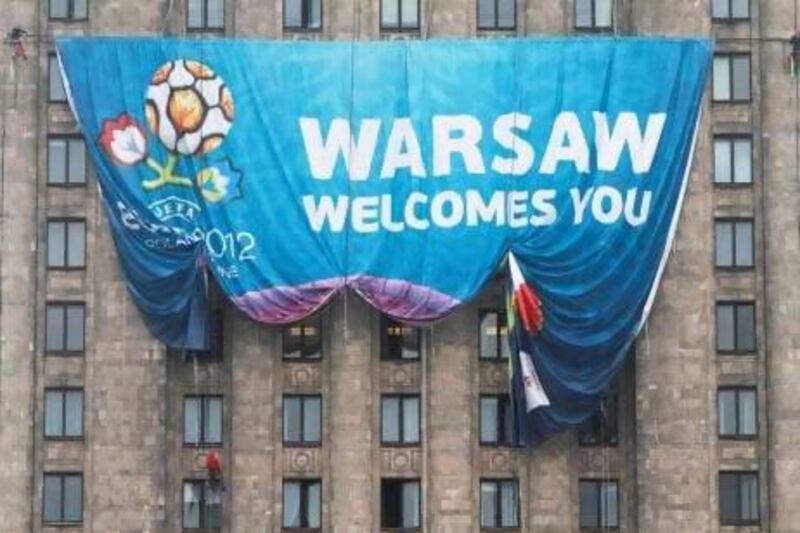Warsaw's freshly constructed National Stadium looks the part, with its Polish flag-themed metal cladding and cavernous capacity.
The walk across the Vistula, past what were once the king's personal hunting grounds, offers a Euro 2012-branded banner on every ornate lamp post.
Now and again a car will drive past bearing the nation's red and white standard. One or two locals have clad themselves in national team shirts.
The occasional tram stop advertises a magazine interview with Maciej and Wojciech Szczesny, the father and son Poland goalkeepers past and present.
You can tell the biggest sporting event this redeveloping nation has ever taken on is close to kick off. But only just.
The overriding impression of Warsaw on the eve of its European Championship is a sense of calm. If there is a buzz to the capital city, it is a quiet one.
"It seems the party is going on in Gdansk," says Michal Swierczynski, a young Polish journalist. "Here, we're waiting for it to begin."
That coastal city is a well-known tourist resort. Host to Spain, Italy, Ireland and Croatia, Gdansk's group games are more glamorous and its hotels fuller with supporters of those teams.
Warsaw has to make do with Russia, the Czech Republic and opening game opponents Greece. Good for Poland's potential to progress; poor for the presence of travelling supporters.
Physically, the city is in a state of upheaval. Poland assesses investment into delivering its half of the tournament at €23 billion (Dh104.9bn).
While its four stadiums have been built or renovated on time not all the infrastructure spend has met deadline.
An efficient new railway line carries visitors from Warsaw Chopin Airport to the city centre, but the second metro line intended to link in the National Stadium and expand the underground network is a construction site scar near the central station.
Warsaw residents complain of unexpected closures of tram lines and rerouting of bus routes as final-hour preparations continue.
They worry about the impact on overseas guests to a nation that justifiably takes pride in its hospitality.
While Poland's motorway network has been hugely expanded with the Euros in mind, some routes have missed the deadline.
"We've never had anything on this scale before," says Sebastian Bialy. "Poland has progressed because of the Euros, but not as much as it could and should have. I love this country but people here tend to look short-term.
"You can build things on the cheap, but will you get the best return?
"You can jack hotel prices up and make a quick profit, but will as many people see your country and will those who come want to come back?"
Uefa's decision to bring its flagship tournament to new territory was a progressive one.
Poland is a nation that suffered gravely in Europe's wars of conquest.
Attacked from every border, by the end of the 18th century Prussia, Russia and Austria had exploited the weaknesses of an elective monarchy to divide its land between them and end the Polish state.
Napoleon then turned part of it into a French satellite duchy, independence not being regained until after the First World War.
In 1939, Nazi Germany and the Soviet Union secretly agreed to divide the country between them, subsequently invading from west and east.
Under the German-Soviet occupation, six million people, almost 20 per cent of the population, were killed; its brightest lights intentionally exterminated.
The capital was particularly hard hit, an estimated 200,000 civilians killed by the Germans during the 63-day Warsaw Uprising in 1944; 85 per cent of its buildings destroyed.
When the war eventually ended Stalin reneged on his Yalta promise of free elections, imposing a communist government that controlled Poland until the Solidarity-led strikes of 1980.
It is a history that has left a mark. "Some might say Poles are fatalists, others argue pragmatic," says Martin Kitson, the Polish-Irish publisher of the In Your Pocket guidebook.
"They will definitely enjoy the tournament and be wonderful hosts but they worry what this is ultimately going to cost them and how much all their useless leaders have pocketed out of this. Old habits die hard.
"Fingers crossed everything goes well. The country has done incredibly to achieve what it has in the last five years.
"Not everything is finished and society isn't perfect, but these five years have changed the country a lot and it ought to be congratulated on what it's achieved. If you consider where it was even 10 or 15 years ago it is incredible.
"Poles really care what Western Europe thinks and if they can pull this off both on the pitch by getting out of the group and off it by hosting a well-organised tournament this could be a watershed moment for the country."
Follow us
[ @SprtNationalUAE ]





